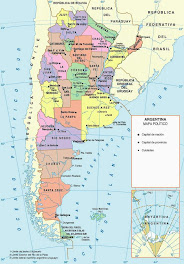So Cristina Fernández de Kirchner came out well on top in the primary elections that took place on 14 August and looks to have set herself up for somewhat of a comfortable victory come the actual Presidential elections this October.
CFK obtained 50.07% of the votes, way ahead of her closest rival, Ricardo Alfonsín, the UCR candidate and son of the first democratically elected president post military dictatorship Raúl Alfonsín, who got 12.17%.
And with her needing only 45% of the votes in October to avoid a second round run-off, the primaries have delivered pretty much all they’re good for delivering, and that’s a reasonably fair indication of how the country will vote in October; and voting for Cristina it seems, is what half the country plans on doing.
The present system of primary voting came into being in 2009 when a bill passed by the Argentine congress made some modifications to the party system. Open primaries were hence introduced to decide who would be each party’s candidate for President, Vice-President, national representatives and some other offices.
The primaries are open, simultaneous and mandatory, which means every citizen must vote and can make one selection for each position, choosing a candidate of any party, regardless of whether they are a member of that party or not. Voters can cut their votes and select a Presidential candidate from one party and a Vice-Presidential candidate from a different party; but they can only nominate one Presidential candidate and one Vice-Presidential candidate.
For example, all of the Frente Para Victoria (FPV) pre-Presidential candidates appear in a list with their photos, and all of the Civic Radical Union (UCR) pre-candidates appear in another. The same is done for the pre-Vice-Presidential candidates etc. Voters tick the box to nominate a candidate for each position.
But with each party only putting forward one candidate for each position, the whole object is totally and let’s face it, utterly defeated.
The original idea of the primaries, like many things in Argentina, was to make the way in which parties choose their candidates more democratic. But the bill wasn’t particularly well thought through and so doesn’t require parties to put forward a minimum number of candidates. They therefore just nominate the candidate they’ve already chosen. Thus, as is so often the case with many democratic practices, the whole shebang just costs a lot of money and is positively pointless. Unless of course a mock election has a point.
For Cristina the point has been to further confirm her blatant lead in the polls and to cement her popular popularity.
The results for Presidential nominations were as followed:
Cristina Fernández de Kirchner (FPV) 50.07%
Ricardo Alfonsín (UDESO-UCR) 12.17%
Eduardo Duhalde (FP-Federal Peronism) 12.16%
Hermes Binner (Progressive Front-PS) 10.26%
Alberto Rodríguez Saá (ACF-Federal Peronism) 8.17%
Elisa Carrió (CC-ARI) 3.24%
Jorge Altamira (FIT) 2.48%
Alcira Argumendo (Proyecto Sur) 0.9%
Sergio Pastore (Accion Vecinal) 0.31%
Jose Bonacci (Campo Popular) 0.24%
Ricardo Alfonsín (UDESO-UCR) 12.17%
Eduardo Duhalde (FP-Federal Peronism) 12.16%
Hermes Binner (Progressive Front-PS) 10.26%
Alberto Rodríguez Saá (ACF-Federal Peronism) 8.17%
Elisa Carrió (CC-ARI) 3.24%
Jorge Altamira (FIT) 2.48%
Alcira Argumendo (Proyecto Sur) 0.9%
Sergio Pastore (Accion Vecinal) 0.31%
Jose Bonacci (Campo Popular) 0.24%
The primaries stipulate that candidates who receive less than 1.5% of nominations cannot stand in the real elections which means the only changes come October will be that the bottom three above will not go to the ballot.
In the face of criticism, the Interior Minister Florencio Randazzo assured that the newly implemented primary elections were “a complete success” and that this methodology “is here to stay.”
He went on to say that “the Argentine population is certain of the need to have candidates selected through a wider, more democratic system that leaves behind the old candidate-picking methodologies.” Just how the Argentine population has any say over which candidates are picked when parties give them the massive choice of one candidate remains to be seen.









Excellent comments! Only the form of nominations appears have changed, not the substance. Power gravitates to the hands of those that seek it.
ReplyDelete